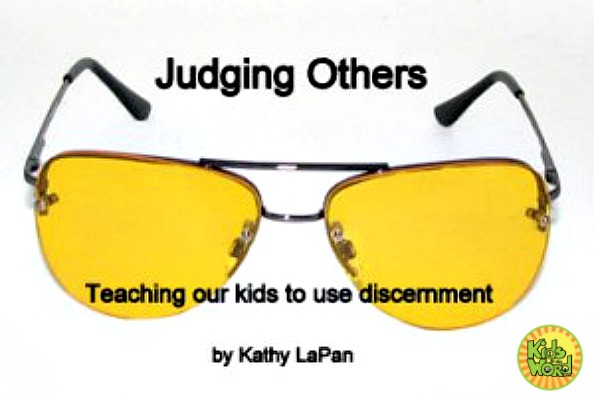“Don't judge me!”
“You're so judgmental!”
“You can't judge; each person has their own truth.”
Our culture has a misguided interpretation of judging. It is used in a derogatory fashion, with a “holier than thou” attachment that is intended to make the “judger” appear closed-minded, ignorant, and possibly cruel. Matthew 7:1 is trotted out as evidence: “Judge not…”
But that is not the whole verse. If we look at the entire verse, Jesus' meaning becomes clear: “Judge not, that you be not judged. For with the judgment you pronounce you will be judged, and with the measure you use it will be measured to you.” Jesus was not telling us to refrain from judging others, but rather to use the same standard we apply to others with ourselves.
He was telling us not to be hypocritical.
The Bible is very clear on the use of judgment, or discernment:
My son, do not forget my teaching, but let your heart keep my commandments, for length of days and years of life and peace they will add to you. Let not steadfast love and faithfulness forsake you; bind them around your neck; write them on the tablet of your heart. So you will find favor and good success in the sight of God and man. Trust in the Lord with all your heart, and do not lean on your own understanding. (Proverbs 3:1-6)
God expects us to learn His teachings and apply them to our lives. There is not an individual truth for each person, but rather one overarching truth for all people. Although some do not accept that truth, it doesn't make it less true.
An analogy I have heard before is that we are all born wearing yellow sunglasses. When we look at the sky, it appears green. Once you accept Jesus as your Savior, the sunglasses are removed and you can see the blue sky as it actually appears. However, people will try to tell you it is green. They can't see the truth until they choose to remove the sunglasses.
Although they don't see what you see, the truth doesn't change. The sky is blue regardless of perception.
When we apply the discernment, or judgment, that was taught to us by the Lord, there will be people who resist that truth.
It is critical that we teach our children the real meaning of judgment and how to apply it. Our post-modernist, “each person has their own truth,” everything-goes culture will try very hard to convince our kids they are wrong for applying judgment. They will experience ridicule, conflict, exclusion. The Word will be used against them, misinterpreted, and wrongly applied. Jesus told us we would be persecuted in His name (Matthew 5:11).
Our children must be prepared for that.
- To equip our children for the battles they will fight, we must first encourage memorization of God's Word.
- Secondly, we must show them that we, ourselves, rely on the Bible for truth. Anything that contradicts the Word is untrue. Demonstrating this reliance on the Bible will teach our children to also rely on it.
- Finally, prayer is key to keeping proper perspective. When in doubt, ask God. Trust He will guide you, and teach your children to rely on His answers.
Remind your children, though, that love is the basis of all interactions.
Regardless of how we are persecuted for the Lord's sake, we must respond in love. Arguing and bickering will do nothing to lead people to Jesus, which is our ultimate goal.
Practice rebuttals to common misconceptions your kids will encounter. Teach them to reply in love and with respect, and they will be prepared to use their discernment to lead hearts to Christ. There is no greater achievement we can hope for.
.png)

